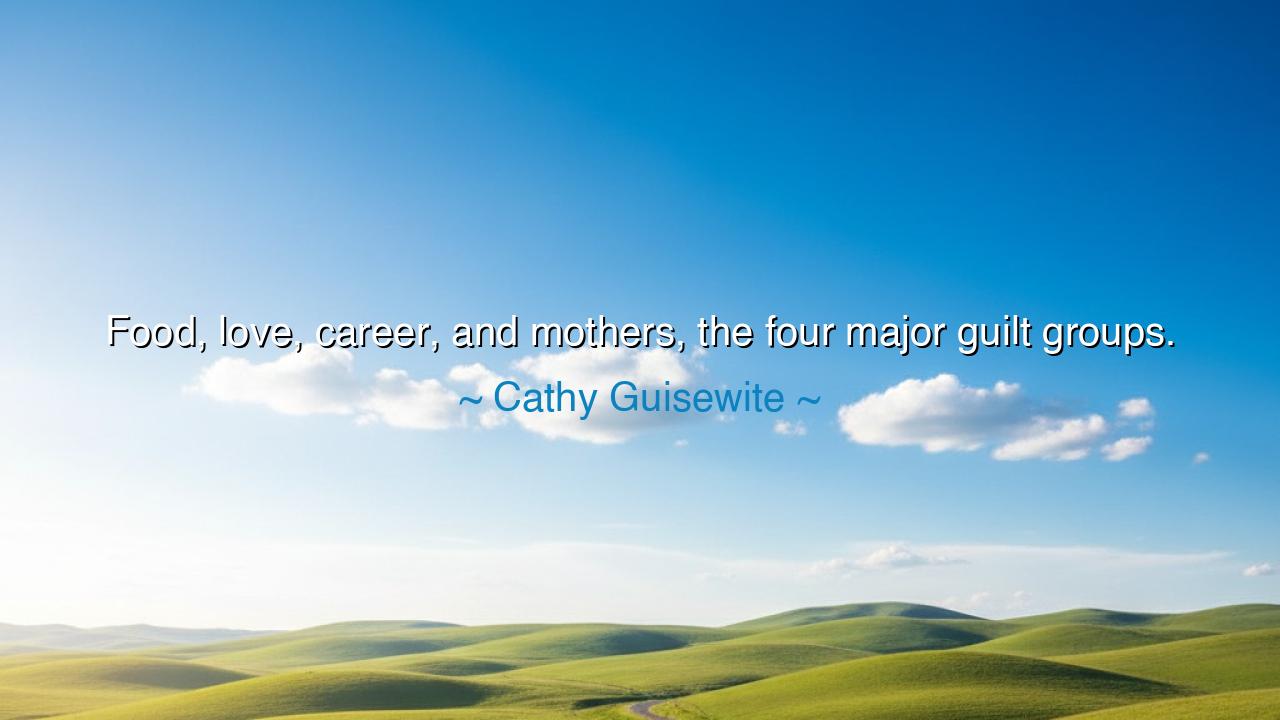
Food, love, career, and mothers, the four major guilt groups.






Host: The room was quiet, the evening light now dimming as the soft hum of the world outside blended with the stillness inside. Jack sat at the table, his coffee cup resting in front of him, the warmth of the drink a quiet comfort. Jeeny stood near the window, her arms crossed, lost in thought. The words of Cathy Guisewite had just been shared, and they seemed to hang between them like a lighthearted, yet meaningful reflection on the pressures we carry.
Jeeny: “I keep thinking about this quote from Cathy Guisewite: ‘Food, love, career, and mothers, the four major guilt groups.’ It’s funny, but also so true, isn’t it? These four areas of life seem to be where we place so much pressure—always feeling like we’re not doing enough, not being enough, in these very core aspects of our existence.”
Jack: “It’s so relatable. It’s like no matter how much we try to manage these parts of our lives—our relationships, our career, our health—we still feel that nagging guilt. We never quite feel like we’re doing it all right. And it seems like these four things—food, love, career, and mothers—are the ones where that guilt is the most intense.”
Jeeny: “Yes! Food, for example. We’re constantly bombarded with conflicting advice about what to eat, how much to eat, when to eat. It’s like we can never win. Either we feel guilty for eating too much, or guilty for not eating the ‘right’ things, or even guilty for indulging in something we enjoy. Same with love—we’re expected to be perfect partners, friends, parents, but we often feel like we’re falling short.”
Host: The room felt quieter now, as if the weight of the conversation had led them both inward. Jack’s gaze was distant, absorbed in the thought of how guilt surrounds the most fundamental parts of life, those areas that are supposed to bring us joy, connection, and fulfillment.
Jack: “It’s interesting how guilt shows up in these areas where we should be most fulfilled. It’s like society has attached this invisible pressure to food, love, career, and our relationship with mothers. But why are these areas so closely tied to guilt? And why does it feel like we have to be perfect in them?”
Jeeny: “I think it’s because they’re so personal, so central to who we are. Food—it’s not just about nourishment, but also about identity and pleasure. Love—it’s about connection, about being seen, and about giving and receiving. Career—it’s how we define ourselves in the world, what we contribute, what we achieve. And mothers, well, the relationship with mothers is so often intertwined with everything—care, sacrifice, and sometimes, expectations. So, when we feel like we’re falling short in any of these areas, guilt creeps in.”
Jack: “That makes sense. And I think Guisewite is pointing out how these areas are the ones where we judge ourselves the most. We feel this constant need to live up to some ideal, and when we don’t meet those standards—whether it's in our health, our relationships, or our careers—we feel like we’re failing.”
Jeeny: “Exactly. But I think what’s key here is recognizing that guilt doesn’t serve us. It’s not helpful to beat ourselves up over food choices, the amount of love we give or receive, the direction of our careers, or how we relate to our mothers. These are parts of life where we shouldn’t feel the pressure to be perfect, and yet, we do. Guisewite is showing us that these ‘guilt groups’ are often places where we are asked to meet unrealistic standards.”
Host: The weight of their conversation seemed to settle into something clearer. Jack sat back, his fingers resting on the edge of his cup as he reflected on the deeper message behind Guisewite’s humor. There was an understanding that guilt, while often felt in the areas of food, love, career, and relationships, wasn’t always a helpful or necessary emotion.
Jack: “Maybe the real question is how to release the guilt in these areas. Instead of seeing these four things as sources of pressure, how can we reframe them as areas of growth, joy, and learning?”
Jeeny: “Exactly. Instead of seeing them as guilt traps, we can see them as opportunities to improve ourselves, but without the pressure of perfection. We can learn to give ourselves more grace, to recognize that we won’t always have all the answers or make the right choices all the time—and that’s okay.”
Host: The quiet in the room deepened, the realization settling between them that perhaps the most important part of these fundamental areas of life—food, love, career, and family—was not perfection, but the ability to embrace imperfection, to learn, and to grow without the weight of unnecessary guilt. The world outside had darkened completely, but inside, there was light, a quiet understanding that the pursuit of joy, connection, and fulfillment need not be burdened by the expectation of perfection.






AAdministratorAdministrator
Welcome, honored guests. Please leave a comment, we will respond soon